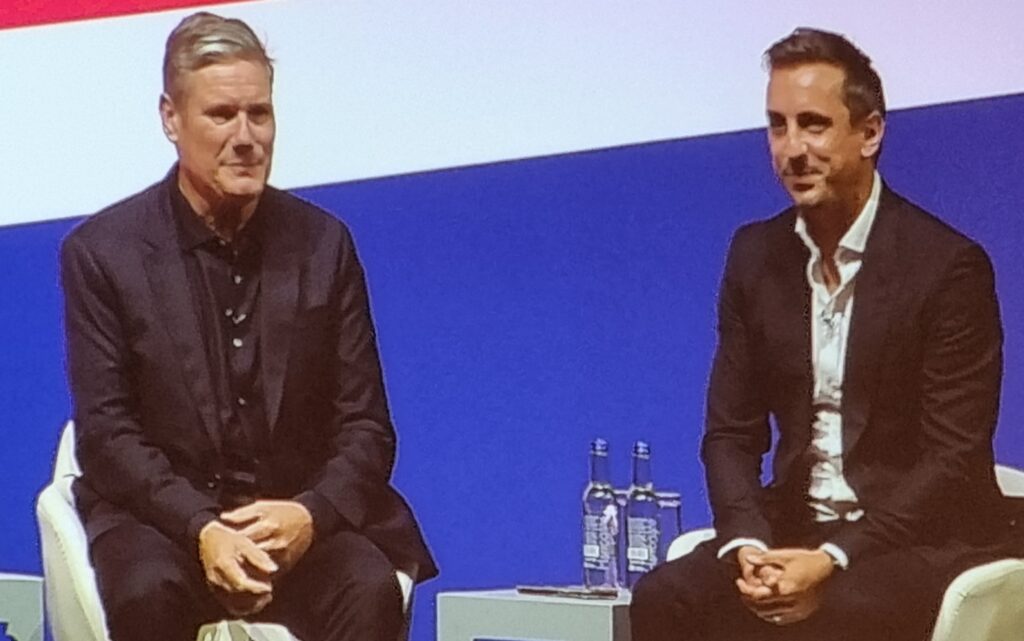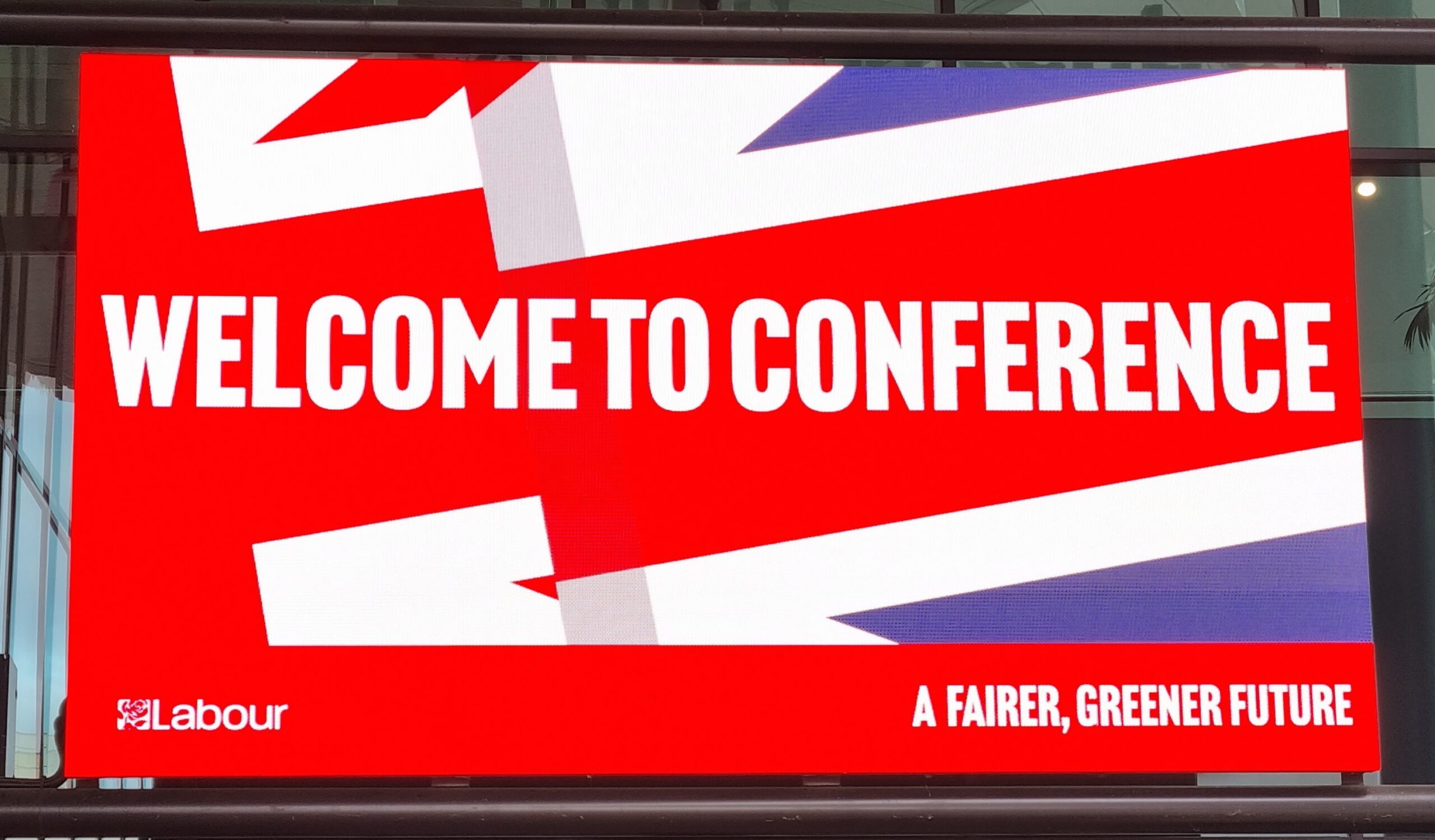By Left Horizons reporters
As predicted, the right wing won all the changes on constitutional amendments proposed yesterday. The card votes published today showed a majority for the right in both the trade union and the CLP sections. At a rough guess, the balance between right and left in the CLP section is now about four or five to one in favour of the former.
This is a big change on previous years, partly as a result of the machinations of the Labour bureaucracy in suspending CLPs and purging lefts and partly because of the genuine illusions that many Labour members have in the current leadership. It seems that the worse the Tory government is, and the more desperate living conditions become, the more that some Party members have retreated into the illusion that a Starmer government can resolve workers’ problems.
Before reporting on the events of today, a little mystery from yesterday was cleared up. A delegate commented that when she waited to come into conference yesterday at 11am – just as the national anthem should have been finishing – she was met with scores of people leaving the conference hall. Even the steward on the door didn’t know why so many people were streaming out as the proceedings were about the begin.
It is clear that the Labour officials organising the event had bussed in or otherwise conscripted a lot of non-delegates, just to get bums on seats for the tribute the Queen and for singing God Save the King…and that’s why delegates who were there thought it was fairly full.
Radical comments from every Shadow minister
When it comes to the debates on political issues, as it was in previous conferences, the cold, harsh realities of everyday life under the Tories brought out many of the aspirations, hopes and clear demands of ordinary workers, notably from the trade union delegations. It may have been more muted than in previous years, but it was there, nonetheless.
It was for that reason that every single representative of the Shadow Cabinet, including big-hitters like Ed Miliband, Lisa Nandy and Rachel Reeves, were obliged to pay lip-service to the awful situation facing working class households, and to present Labour as the champion of working-class people. It was only by making radical comments and giving radical commitments that they were as well received as they were. [Note these reports reflect the content but not the order in which speeches were made]

Louise Haigh, Shadow Secretary of State for Transport, for example, gave a clear commitment, to loud applause, that Labour would bring rail back into public ownership. Ed Miliband played the audience like an old pro. Referring to how cheap renewable energy was compared to fossil fuels, he said, “The undeniable truth of our age is that it is cheaper to save the planet than to destroy it” and to loud cheers, he pledged a Labour government to move to zero carbon by 2030, creating many new industries and new jobs.
Miliband made jokes at the expense of Jacob Rees-Mogg – admittedly easy to do – who he described as “nineteenth century Mogg”. “If you want an energy policy for the 1820,” he joked, “Rees-Mogg is your man. But If you want a policy for the 2020s, you need Labour”. It was all good anti-Tory stuff, and the delegates loved it. He promised that Labour would introduce a National Wealth Fund for Britain, to lead the world in Hydrogen, in decarbonizing industry and in offshore wind.
“Labour cannot tinker around the edges” he said, “We need a fundamental reform to our economy and institutions to put power in the hands of the Many not the Few.” Ed was sailing a bit close to the wind there, accidentally echoing a Corbynite phrase, but delegates loved it and he got a standing ovation.
“green prosperity plan”
Later in the morning, Rachel Reeve, Shadow Chancellor, and the key Labour leader after Starmer (whatever Angela Raynor thinks), was also able to wow the conference with strong anti-Tory messages, referring to “our green prosperity plan”, and a commitment to invest in renewables (she did include nuclear) and “carbon capture”, although that is an untested technology on a large scale.
“I will be Britain’s first green chancellor”, she said. Like Miliband and other Shadow ministers, she took potshots at the Tories, trickle-down economics, Kwasi Kwarteng’s hand-outs to the rich and generally telling delegates things they wanted to hear.
At one point, promising secure, skilled jobs in building, better wages and conditions and many other things from Land’s End to John O’Groats, we almost expected ‘free beer for all the workers’. What was not to like? – and of course, the delegates loved it. “It is not working people that is the problem”, she said, “it is this government that is the problem”.
She promised a government that would be “on the side of workers”, a similar point made later by Lisa Nandy, who said that “the problem in this country isn’t militant workers, it’s a militant government”. In the first 100 days of Labour in office, Nandy promised, “we will repeal the anti-trade union laws”, but as we discussed yesterday, it was not clear if that commitment applied to all anti-union laws or only to Liz Truss’s new ones.
“Council housing, council housing, council housing”
Lisa Nandy’s speech, like those of other Shadow ministers, was very aspirational, to “rebuild this country from the ground up.” It went down well, as did her promise to make council housing a priority. “Our mantra in government will be council housing, council housing, council housing.” That was also well received, as was the promise of a new charter for renters.
All of these leaders spoke in the most radical terms about what a Labour government would do, and it couldn’t be otherwise, because that was the mood music of the conference, reflecting the atmosphere in the real world.

In between shadow ministerial speeches, there were important composites moved, particularly by the trade unions on workers’ rights and conditions Composite number one, for example, moved by Unite and seconded by the CWU, included, among other things, that “the root of this crisis is a structural imbalance of power and wealth decades in the making, which permeates the world of work, how the economy operates and drives institutionalised inequalities of race, gender, disability and class”.
It called for Labour to “Support trade unions as the most effective vehicles to organise workers and win better jobs, pay and conditions…” The mover specifically referred to the need for Labour to support picket lines, as did other speakers.
Bring Royal Mail back into public ownership
Composite 3, from ASLEF and TSSA, included a call for conference to “reaffirm the Party’s commitment to a publicly owned railway and the delivery of infrastructure projects including the eastern leg of HS2, Northern Powerhouse Rail and a rolling programme of electrification. Conference also stands in solidarity with workers taking industrial action over the cost of living crisis”
Composite 4, moved by Dave Ward of the CWU and seconded by Unite, included the call to “Bring Royal Mail back into public ownership, reunite it with the Post Office and create a publicly-owned Post Bank”. In moving it, Dave Ward, specifically raised the issue of picket lines and the need for Labour support for them. To loud applause and cheering he said he was “looking forward to Keir Starmer appearing on Post Office picket lines”.
A fifth composite made a specific reference to wages keeping pace with inflation rates (“and that’s RPI”, the mover said) and a £15 minimum wage. This was moved by Christina McAnea of UNISON, who talked about nurses going to food banks and the ballot of NHS workers for strike action later this year. “They have had enough”, she said, “our members in the NHS are telling us that they have had enough”.
“Our members genuinely believe”, the GMB seconder said, “that they will not be able to pay their bills…We need at least £15 an hour.”
There was some discussion on these composites and the speeches were all along the lines that readers of Left Horizons would expect: comments on longer waiting lists, a higher national debt, greater use of food banks, staff overworked, and above all the pauperization of millions as prices go up relentlessly.
Delegates reflecting harsh reality outside conference hall
The point of reporting on these composites and the debate around them – although there was no real ‘debate’ – is that there is a mountain of expectation on Keir Starmer and any incoming Labour government and a hope that all of these these problems will be addressed. More than one delegate referred to conference resolutions passed, but afterwards ignored or rubbished by Labour ministers or shadow ministers.
The delegates and the composites reflected the harsh reality outside the conference hall, albeit second hand and sometimes muted. Even the right-wing union leaders have to reflect that reality and in turn, shadow cabinet members have to ramp up the rhetoric to reflect it too.
But reading in between the lines, there is a discontinuity between what the Shadow cabinet are promising in their speeches and what they will really deliver. It is like two parallel worlds, one outside and to some extent inside the conference and the other in the closed committee rooms of the Shadow Cabinet.
The commitment to renationalize rail, for example, as we pointed out yesterday, could be interpreted in more than one way. And all of the pledges to be a pro-workers’ party that were made by Shadow cabinet members mean nothing if these same MPs are not prepared to support workers directly in struggle. We have to ask how solid is the commitment to a new green deal; and why were eight CLP resolutions on a green new deal ruled out of order for spurious reasons? To give Ed Miliband a clear run?
Most important of all, despite the many radical-sounding promises made by Rachel Reeves, she didn’t forget to add, for any bankers listening in, that she would be a fiscally responsible chancellor. Her aim is a pro-business, and a pro-worker policy, which is a flat contradiction in terms.
When it comes to a clash of interests, trade unions will support their workers (one hopes) but Reeves, as chancellor, will support the bosses. We should not forget that for all the radical rhetoric behind Keir Starmer there are right-wingers like Lord Mandelson, Mr “greed is good” himself.
Feisty comments from Dave Ward
There was some expectation that there might be a clash between the trade unions and the Labour leadership on the issue of workers’ wages, strikes and picket lines. But apart from some feisty comments by Dave Ward, and some other barbs directed against Starmer’s reluctance to support workers, it looks like the right-wing union leadership have gone out of their way to avoid anything that embarrasses the leadership.

The leaders of UNISON, GMB and USDAW are playing a double game, voicing the very real anger of their members and their demands for a £15 an hour minimum, and other things. But at the same time they shrug their shoulders when the Labour leadership, which they bend over backwards to support, ignores anything that doesn’t interest them…workers’ rights, a £15 minimum, and so on.
All of the resolutions on workers rights’ and wages, composites 1 to 5, were passed overwhelmingly on a show of hands – so the right-wing union leaders can go home happy that they have ‘done their bit’ and they can then turn a blind eye to the fact that the leadership will ignore the composites.
A good indication of the two parallel worlds was the disgracefully inconsiderate behaviour of the VIPs wheeled in for Rachel Reeves’ speech. Large blocks of the visitors’ gallery had been cordoned off – to the annoyance of many visitors trying to find a seat – so these worthies could attend just for her speech at 12 o’clock.
At 11.50 exactly, dozens of VIPs, I would guess mostly PLP members, businesspeople and other assorted notables, noisily trooped into their seats, disrupting the conference as it proceeded, and none of them having bothered to listen to any of the discussion on workers’ pay or workplace rights. They came for Rachel Reeves and only for Rachel Reeves.
Then, as soon as Reeves finished, they made an even more noisy exit, as the conference attempted to continue with its business, again showing complete contempt for the delegates and the issues being discussed. Clearly they take the view that delegates and the Labour rank and file can sound off as much as they like…because these delegates, after all, are the ‘little’ people, and they aren’t really the ones (like Reeves) who will decide Labour policy. Two worlds.
We will probably have to have a separate report on some of the other discussion, on Day 2, but it should not go unreported that Labour policy – at least as far as conference goes – is now in favour of electoral reform (ie proportional representation) and in favour of the abolition of the House of Lords.
“In conversation”…with Gary Neville
In an interesting new departure…towards the end of the afternoon there was an “In Conversation” session, with Lucy Powell, Shadow spokesperson for digital communications, Keir Starmer and Gary Neville, former professional footballer and TV pundit.
The conference auditorium was quite crowded for this, my guess being that most delegates and visitors wanted to hear Gary Neville coming out as a Labour supporter. He joined the Labour Party last year and commented that his reception (which was very good) was the “best he’d had in the city”.
It was important he said, to play “left of centre” on the field. “Just imagine” Starmer said, trying painfully to throw in a footballing joke, “that the Tories were Liverpool football club”. Neville responded that it was not just a northern issue, affecting Liverpool and Manchester and the north. But Starmer again took the conversation towards inane comments on football and the England Women’s team (the ‘Lionesses’).
Bankers’ bonuses derided by Neville
Gary Neville came over as very articulate, supporting workers who strike “because they have no alternative” in an extremely difficult situation. He also had a go at the press in this country, which gives the Tories “cover” by not dealing with real issues, like health, education and social care.
Most of the delegates had heard Keir Starmer before, of course, but it was like a breath of fresh air to hear this radicalism coming out of the mouth of a footballing legend. He probably needs to look out, because the new party rules might mean the NEC might be planning to parachute him into some Northern constituency to win it for Labour.
The best of the fringe in the evening was the Tribune rally, another big event in St George’s Hall, with a capacity of around a thousand. It was every bit as electrifying and lively as last year. There were many speakers, including Zara Sultana MP, trade union speakers and others – including unfortunately a speaker from Sinn Fein, a party deeply rooted in sectarianism, despite its attempt to dress itself as a radical and left-wing party, which it most certainly is not.
The biggest applause and standing ovation was for Jeremy Corbyn.
Judging by the first two days, there is a clear difference in this year’s conference, even compared to twelve months ago. Speaker after speaker from the rostrum reflected the problems and difficulties of everyday life, and the struggle to maintain a decent living, as did some of the composites. But it has to be said that the rostrum speakers were not as strident, as determined or as forceful as a year ago.
That is largely down to the fact that the right wing now dominate both the trade union section and the CLPs. They know it, and many right-wingers who kept their heads down in the Corbyn years have come back. The big problem for them in the long run is that the tide of history is not going their way. With capitalism in a profound crisis, there is little room for reforms and improvements in the daily lives of workers. Whether in opposition or in power, the right wing have plenty of words, but few real answers.
There were so many references to the next Labour government that there is almost a pre-election, ‘let’s not rock the boat’ mentality creeping in. Other than at the large fringe meetings, the left has been far less in evidence in Liverpool than it was in Brighton last year. At least that is so far. We’ll have to wait to see if Day 3 changes that.



